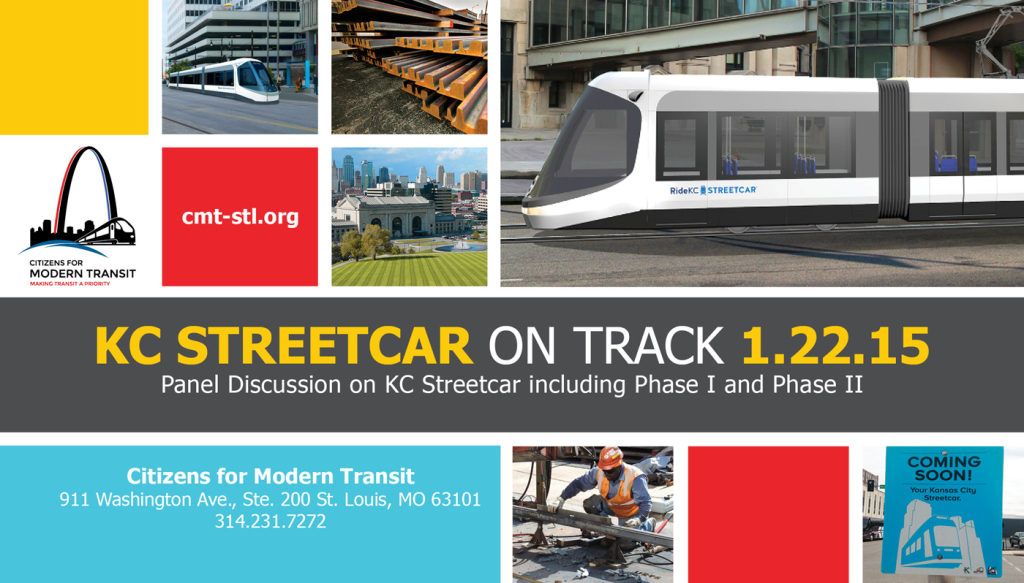 CMT hosted a sneak peek of the Kansas City Streetcar project in St. Louis on Jan. 22. The streetcar project is currently under construction, has millions in development going in along its path, and residents will soon be able to hop on board in early 2016. The 2 mile modern street-running streetcar project is estimated to cost $102 million.
CMT hosted a sneak peek of the Kansas City Streetcar project in St. Louis on Jan. 22. The streetcar project is currently under construction, has millions in development going in along its path, and residents will soon be able to hop on board in early 2016. The 2 mile modern street-running streetcar project is estimated to cost $102 million.
CMT’s panel discussion included perspectives from the head of the KC Streetcar Authority, the City Engineer for the City of Kansas City, and the leading engineers on Phase I of the project and Phase II. As the most recent large scale public transit infrastructure project in Missouri, CMT’s goal was to spur discussion on possible funding mixes, partnerships and excitement for the local transit system in the region.

The discussion provided some good takeaways for St. Louis on current discussions on transit priorities and funding options going on today.
- There is tremendous development potential around transit infrastructure like streetcars and light rail. Hundreds of millions of dollars in development is under construction along the new KC streetcar line. According to the speakers,$308 million is a direct result of the initiation of the Streetcar project, and$952 million has occurred within the existing TDD for the Streetcar project. We currently have 46 miles of light rail in St. Louis with 37 stations. There is still ample room to grow around the current infrastructure in place for MetroLink in the region.
- This project is coming to fruition as a result of a public-private partnership that included the creation of a non-profit to run the new system. There are significant possibilities with public-private partnerships for transit– St. Louis recently saw a big win as the result of a public-private partnership around the $10.3 million TIGER award to the region for a new light rail station on the MetroLink alignment and upgrades to the CWE Station. This is just the beginning for the region. Whether large capital infrastructure projects or incremental build-outs of the current system due to fiscal constraints, St. Louis is going to have to be creative and think outside the box for funding mechanisms to move any project forward.
- Kansas City also demonstrated just how important having political champions is for moving a large scale transit project forward. Kansas City’s Mayor Sly and the City Council took ownership of the project and spearheaded many of the necessary rezoning, parking requirements and policy issues. There is significant opportunity for the elected officials who make up the board of the East- West Gateway Council of Governments to take the lead on creating a list of prioritized transit projects for the region from the list of ‘illustrative’ projects,’ projects voted as important transit projects for the region but with no financial resources available to build. St. Louis has not had a regional priority list of transit projects in years. Now is a great opportunity to create the list while looking at possible funding options moving forward.
- This project used creative financing packages, which included the formation of a Transportation Development District (TDD) including a property tax and sales tax to fund the project along with TIGER funding and federal CMAQ funding. In fact the 2 mile starter line will be free to ride in Kansas City based on the operating plan in place.Locally, CMT is currently exploring these types of funding solutions for transit. In fact, Citizens for Modern Transit is currently working with Transportation for America to conduct a six-month study to assess the current fiscal capacity for transit expansion and operation, analyze the best practices of transit strategies nationwide, examine potential changes to state constitutional language or statutes that would create additional funding sources for public transportation, develop a revenue model to project receipts from different sources and develop a menu of possible funding strategies based on the analysis and findings for local consideration. Finding a funding mechanism for transit in St. Louis is job one for CMT. In the absence of funding, the St. Louis region is missing its opportunity to build stronger, mixed-use neighborhoods with transit.
Expansion potential exists for the St. Louis market, as long as both capital and operating funding is secured. We are hopeful St. Louis can build off the KC Streetcar discussion to move transit forward in this region.
Check out the presentation from the CMT Panel Discussion on the KC Streetcar.